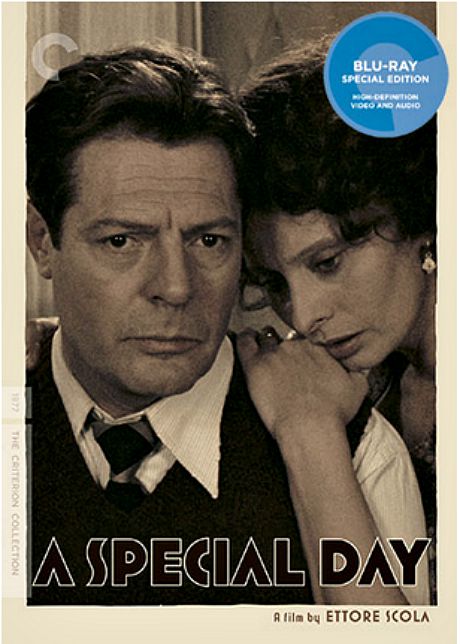I used to struggle with film reviews when I first began in this racket back in the late ’70s. I was so intimidated by the great critics of the day (Sarris, Kael, Simon, Canby, Denby, Corliss, et. al.) and so desperate to sound cool that I could barely make a paragraph work after an hour’s toil, and a whole review would take four or five hours and sometimes a whole day. I couldn’t relax or breathe, kept rewriting myself into a stupor. And then one day the clouds parted. I wrote a review of Ettore Scola‘s A Special Day and for the first time, it just flowed right out. I rewrote and refined, of course, but the initial writing was much less tortured than usual. So I’ve always felt a special kinship with this 1977 film (which was actually released in the States in ’78, if I’m not mistaken). And so I’m definitely going to beg Criterion’s p.r. company for a freebie of the upcoming Bluray (due on 10.13).

Boilerplate: “Italian cinema dream team Sophia Loren and Marcello Mastroianni are cast against glamorous type and deliver two of the finest performances of their careers in this moving, quietly subversive drama from Ettore Scola. Though it’s set in Rome on the historic day in 1938 when Benito Mussolini and the city first rolled out the red carpet for Adolf Hitler, the film takes place entirely in a working-class apartment building, where an unexpected friendship blossoms between a pair of people who haven’t joined the festivities: a conservative housewife and mother tending to her domestic duties and a liberal radio broadcaster awaiting deportation. Scola paints an exquisite portrait in sepia tones, a story of two individuals helpless in the face of fascism’s rise.”
Note: The climax comes when Loren and Mastroianni’s characters collapse on a bed and make love, despite Mastroianni being gay. It’s a metaphorical coupling, and certainly no indication that Mastroianni has reconsidered his orientation. I think it’s safe to say that if A Special Day was being made today for the first time, the lovemaking scene would not be allowed. The scene would be criticized by the p.c. commissars as a shameful kowtowing to straight-audience expectations and would probably be removed during the script-reviewing stage.









